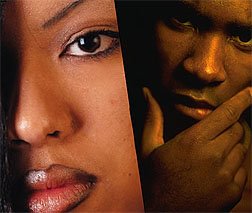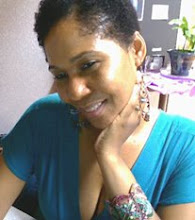and the BAPSploitation Phenomenon
 I recently attended a Blackweekly.com event to discuss Tim Alexander’s upcoming movie, Diary of a Tired Black Man. A filmmaker friend living in Japan sent me a clip from the movie two months ago. At the time, I dismissed it as dated and derivative, something an eager first-year film student might promote on MySpace. Then last week, a white female friend forwarded me an NPR article on the controversy Alexander’s project is generating. Judging from the buzz around the ‘Net, old attitudes about the sass-spittin' Black American Princess (BAP) are resurfacing under the guise of serious dialogue about black relationships.
I recently attended a Blackweekly.com event to discuss Tim Alexander’s upcoming movie, Diary of a Tired Black Man. A filmmaker friend living in Japan sent me a clip from the movie two months ago. At the time, I dismissed it as dated and derivative, something an eager first-year film student might promote on MySpace. Then last week, a white female friend forwarded me an NPR article on the controversy Alexander’s project is generating. Judging from the buzz around the ‘Net, old attitudes about the sass-spittin' Black American Princess (BAP) are resurfacing under the guise of serious dialogue about black relationships.For those who haven’t seen the three-and-a-half minute clip that’s been circulating the blogosphere, it goes a little something like this: Four upscale black women are lounging around the house having girl talk. Through the window, they spy ex-husband, James, the titular character, pulling up in the driveway with his new lady – a white woman. The typical reactionary, combative dialogue that many sisters engage in whenever they peep Heidi on Hakeem’s arm ensues. When our weary hero hits the doorstep to pick up his daughter, his ex-wife lambastes him for dating a white woman, calling him a “weak punk.” Nay, our protagonist retorts, this isn’t the case. He’s footing the bill for his ex’s house and car, taking care of his kid, and if he’s now dating a white chick, it’s because the new relationship has finally brought him peace. “I am not a weak black man. I am a tired black man,” James says with fervor. “Tired of dealing with angry black women like you.”
Granted, I haven’t seen Diary of a Tired Black Man in its entirety – the movie doesn’t hit theaters until later this year -- but from the snippet I viewed, something feels exploitative about the project. It seems to profit from and prey on the fears of the BAP who can’t find a mate. There is a culture of hysteria built on the plight of the single, successful black shrew headed for spinsterhood and the diminishing “good black man” resource pool. Are black women with their fabled ‘tudes chasing all the eligible brothers away?
 According to Tim Alexander, Angry Black Woman syndrome is at the heart of the conflict. The director graced the Blackweekly.com gathering to expound on this “disease.” He likened sisters to “child molesters” who keep going back for their fix of the forbidden – in this case, thugs and bad boys. These women are mistreated for so long that they become hardened, and when a respectable black man comes along, he’s dismissed as weak and irrelevant. In his talk at the Blackweekly fest and in interviews that I’ve read, he also maintains that sisters are embittered, hostile and defensive due to a lack of positive black male role models in their childhood, and this negativity is reinforced as they grow older. Alexander comes off as a ’hood psychologist not only attempting to diagnose black women’s pathology, but reframing it as an epidemic in need of immediate treatment. Enter Diary – his way of sparking a discussion and remedying Angry Black Woman syndrome.
According to Tim Alexander, Angry Black Woman syndrome is at the heart of the conflict. The director graced the Blackweekly.com gathering to expound on this “disease.” He likened sisters to “child molesters” who keep going back for their fix of the forbidden – in this case, thugs and bad boys. These women are mistreated for so long that they become hardened, and when a respectable black man comes along, he’s dismissed as weak and irrelevant. In his talk at the Blackweekly fest and in interviews that I’ve read, he also maintains that sisters are embittered, hostile and defensive due to a lack of positive black male role models in their childhood, and this negativity is reinforced as they grow older. Alexander comes off as a ’hood psychologist not only attempting to diagnose black women’s pathology, but reframing it as an epidemic in need of immediate treatment. Enter Diary – his way of sparking a discussion and remedying Angry Black Woman syndrome.I believe some of the filmmaker’s observations about black women are valid; however, I question the sincerity of his attempts to bridge the gap. Did his protagonist James have to roll up to his ex-wife’s crib with a white woman, or is it just a marketing ploy to fill seats in the theater? What would have happened if our weary hero had brought along another black woman? Would the sisters in the house have been so neck-swiveling and eye-rolling then? And, for a black man to finally achieve some “peace” in his household, is Alexander suggesting that non-black women are the answer? If so, doesn't this play into the stereotype of white women as accommodating and subservient?
During the discussion, participants were asked to come up with possible solutions to the dilemmas posed in Alexander’s film. I came up with a suggestion just as controversial as the premise in Diary: black women should consider dating outside of our race. Not simply to be reactionary to the growing number of Heidi-Hakeem hookups, but to demystify deeply-rooted beliefs we have about interracial relationships. It would also challenge us to keep our options open, and rethink the long-held notions of “loyalty” we have regarding black men.
After I made those comments, I was about as popular as Naomi Campbell at a housekeeper’s convention. One extremely agitated brother accused me of high treason, of attempting to destroy the foundation of the black family. A few other black men approached me at the close of the festivities, questioning my “allegiance” to the race, and wondering how long I had been dating white men. Upon cross-examination, I discovered that these brothers had “others” hiding in their sexual repertoires, but for a black woman to consider kickin’ it with Biff or Beltran is unthinkable. Why are we held to such a stringent double standard? If a black man is in love with a non-black woman – and I say to each, his own – he’s colorblind. But if sisters fall in love with someone outside of their race, they’re sellouts or gold-diggers. This lack of balance and fairness further serves to marginalize us and reinforce the notion that we aren’t being heard by black men. Our rather, we’re not hearing each other.
As much as I dislike Alexander’s exploitation of successful, single black women’s woes – or BAPSploitation – I have to give him credit for inciting dialogue. As evident at the Blackweekly.com gathering, regardless of whether you loved or hated the movie’s premise, it has people talking. What I’m hoping that the director can achieve with his new film is balance. Diary has been touted as the black man’s Waiting to Exhale, and I hope it can resuscitate a genuine discussion about the dilemmas that really plague our relationships, instead of ascribing blame for the failure of said relationships on the loud-mouthed, conflict-driven, gold-digging Angry Black Woman. Neither sex is flawless, and we need to take accountability for our shortcomings instead of pointing the finger. A movie that seeks to liberate a brother by shutting down his sister will be just plain Tired.


